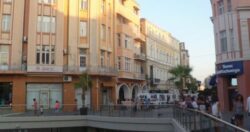Bulgarian prosecutors on Saturday said they had opened a probe into a bomb attack being planned by a student from an elite high school who was inspired by Daesh.
The student was described as being “extremely intelligent” and lived in Bulgaria’s second largest city, Plovdiv.
This was the first investigation of its kind in Bulgaria. The youth had been the subject of several months, perhaps a year, of a recruitment process by the “Islamic State”, he said.
After they met via a social network, the recruiter had used encrypted communication service Telegram to communicate with the boy. Geshev said that he would not disclose how the youth had found the recruiter.
The boy’s father had co-operated in the arrest, taking him out of school so that he could be taken into custody, Geshev said, underlining that the youth had not been arrested on school premises.
“Several home-made explosive devices were found at his home, including a bomb made with pipes and electric wires,” he said.
“Furthermore, 14.5 kilogrammes (32 pounds) of the explosive used in attacks in Belgium and France, were found in a plastic container surrounded by nails to cause maximum destruction,” he added.
In 2017, the EU’s police coordination agency launched a probe into whether the so-called “Islamic State” militant group developed their own social media platform to sidestep authorities.
Although that hasn’t been verified it is assumed that Daesh or Islamic State are using certain circles to avoid the eyes of the police.
Deputy prosecutor general Ivan Gueshev did not identify the explosive but said it was the same as the one used in a 2012 attack on Bulgarian Black Sea resort of Burgas.
“This appears to be a classic case of the recruitment and radicalization of a minor” on the Internet, he said.
A Daesh flag was also found in a room which was serving as students workshop.
EU authorities have bolstered counterterrorism efforts across the continent in the wake of deadly attacks in European capitals, including Paris, Berlin and Brussels.
Most notably, authorities have pressured social media giants such as Facebook and Twitter to tackle the spread of terrorist propaganda on their platforms.
The extremist content discovered in the Europol-coordinated operation had been hosted on 52 social media platforms.
…………………………..
[simple-payment id=”11767″]





